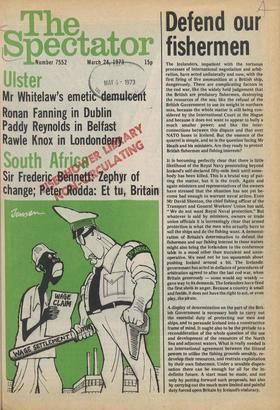Defend our fishermen
The Icelanders, impatient with the tortuous processes of international negotiation and arbitration, have acted unilaterally and now, with the first firing of live ammunition at a British ship, dangerously. There are complicating factors in the cod war, like the widely held judgement that the British are predatory fishermen, destroying the resources of the sea; like the refusal of the British Government to use its weight in northern seas, because the whole matter is still being considered by the International Court at the Hague and because it does not want to appear to bully a much smaller power; and like the interconnections between this dispute and that over NATO bases in Iceland. But the essence of the quarrel is simple, and so is the question-facing Mr Heath and his ministers. Are they ready to protect British fishermen and fishing interests?
It is becoming perfectly clear that there is little likelihood of the Royal Navy penetrating beyond Iceland's self-declared fifty-mile limit until somebody has been killed. This is a brutal way of putting the matter, but it is the truth. Again and again ministers and representatives of the owners have stressed that the situation has not yet become bad enough to warrant naval action. Even Mr David Shenton, the chief fishing officer of the Transport and General Workers' Union has said, "We do not want Royal Naval protection." But whatever is said by ministers, owners or trade union officials it is increasingly clear that armed protection is what the men who actually have to sail the ships and do the fishing want. A demonstration of Britain's determination to defend the fishermen and our fishing interest in these waters might also bring the Icelanders to the conference table in a mood other than truculent and uncooperative. We need not be too squeamish about pushing Iceland around a bit. The Icelandic government has acted in defiance of procedures of arbitration agreed to after the last cod war, when Britain generously — some would say weakly — gave way to its demands. The Icelanders have fired the first shots in anger. Because a country is small and feeble, it does not have the right to act, or even play, the pirate.
A display of determination on the part of the British Government is necessary both to carry out the essential duty of protecting our men and ships, and to persuade Iceland into a constructive frame of mind. It ought also to be the prelude to a reconsideration of the whole question of the use and development of the resources of the North Sea and adjacent waters. What is really needed is an international agreement between the littoral powers to utilise the fishing grounds sensibly, redevelop their resources, and restrain exploitation by their own fishermen. Under a sensible dispensation there can be enough for all for the indefinite future. A start must be made, and not only by putting forward such proposals, but also by carrying out the much more limited and painful duty forced upon Britain by Iceland's obduracy.


































